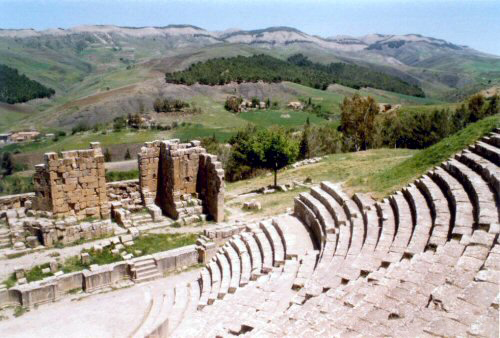 We are one the road again. As we write these words, we are on a train rattling its way down the Eastern Seaboard of the U.S. We packed along some reading material, including Albert Camus’ Lyrical Essays, which we have been making our way through of late.
We are one the road again. As we write these words, we are on a train rattling its way down the Eastern Seaboard of the U.S. We packed along some reading material, including Albert Camus’ Lyrical Essays, which we have been making our way through of late.Camus was quite a traveler in his day and these essays include a number of travel pieces…. In Prague… or traveling through Italy… or in some town along the Mediterranean littoral like Oran or Tipasa… or in the mountains at Djemila (pictured above)... Camus writes beautifully of these places, the words like little crème-filled chocolates you pick off the page. (Hence, the apt title “lyrical essays.”)
In reading one essay titled “Love of Life” we came across this bit of delicious absurdity:
“Without cafes and newspapers, it would be difficult to travel. A paper printed in our language, a place to rub shoulders with others in the evening enable us to imitate the familiar gestures of the man we were at home, who, seen from a distance, seems so much a stranger.
For what gives value to travel is fear. It breaks down a kind of inner structure we have. One can no longer cheat – hide behind the hours spent at the office or at the plant (those hours we protest so loudly, which protect us so well from the pain of being alone.)
I have always wanted to write novels in which my heroes would say: ‘What would I do without the office?’ or again: ‘My wife has died, but fortunately I have all these orders to fill for tomorrow.’ Travel robs us of such refuge.”
There is a lot of good stuff in just this little excerpt. We loved the phrase “imitate the familiar gestures of the man we were at home” – which gets to the whole idea of identity and how weak it really is… how distance can make that person we thought we were seem strange, even unreal.
Then there is the idea of our “inner structure” which we often hide behind. We toil away at little daily labors that we think are so important. But when we can no longer hide in the monotony of the daily living, it seems more plain that we are – each of us – alone.
Camus found that when we travel we are “stripped of our props” and “deprived of our masks.” Put out of our routine, we are made more aware of the present, more observant of little details. We engage our five senses more readily. We have often written how travel makes us feel more absurd for the reasons that Camus points out.
Now, we know that travel itself is not a requirement of absurdity. You can be absurd anywhere – in a cubicle in Manhattan or in a jail cell in LA. You can be absurd without ever leaving your own self-made bubble of existence – no matter its physical dimensions. There are many ways to see the absurd and to feel it, as we write about here on this blog. We only highlight the travel experience as one of those ways.
The many ways and byways of the absurd experience fascinate us to no end, and we aim to share and explore as many of them as we can find.



No comments:
Post a Comment